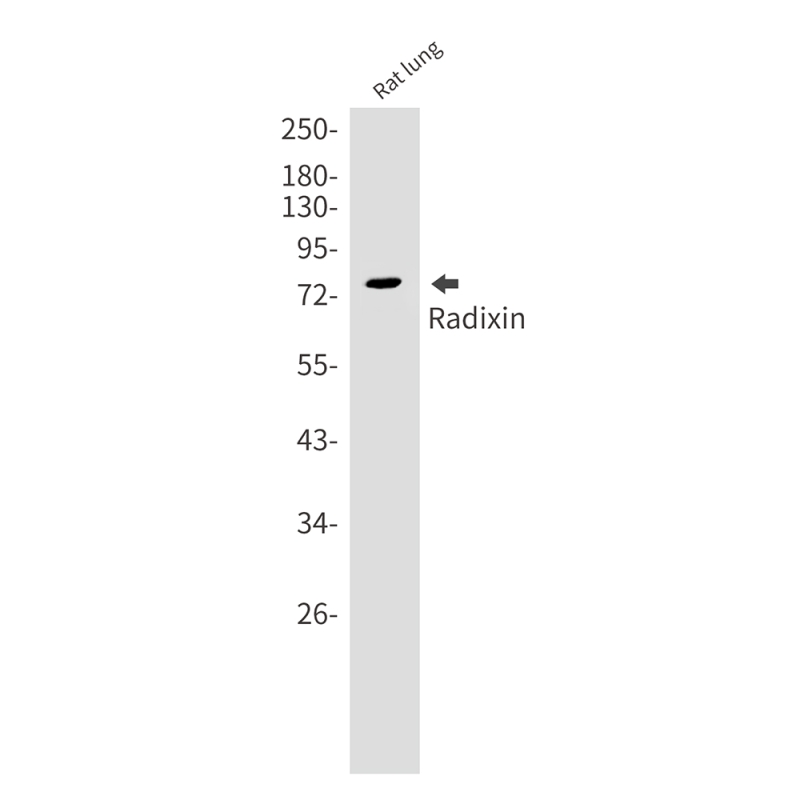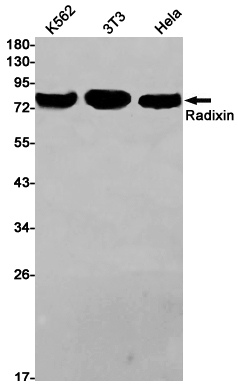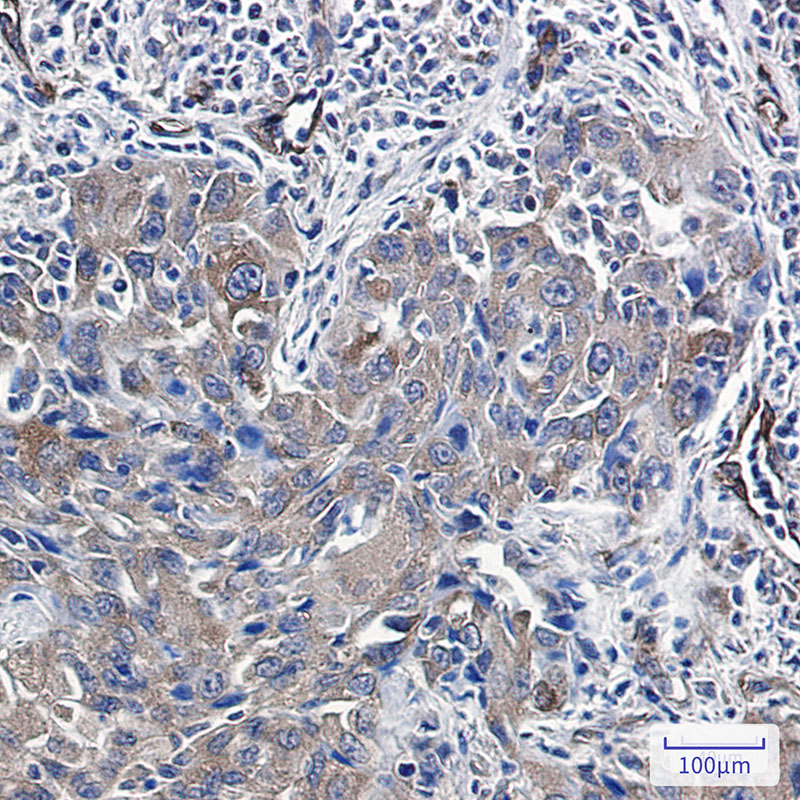


| WB | 1/500-1/1000 | Human,Mouse,Rat |
| IF | 1/20 | Human,Mouse,Rat |
| IHC | 1/50-1/100 | Human,Mouse,Rat |
| ICC | 技术咨询 | Human,Mouse,Rat |
| FCM | 咨询技术 | Human,Mouse,Rat |
| Elisa | 咨询技术 | Human,Mouse,Rat |
| Aliases | RDX; Radixin |
| Entrez GeneID | 5962 |
| WB Predicted band size | Calculated MW: 69 kDa; Observed MW: 80 kDa |
| Host/Isotype | Rabbit IgG |
| Antibody Type | Primary antibody |
| Storage | Store at 4°C short term. Aliquot and store at -20°C long term. Avoid freeze/thaw cycles. |
| Species Reactivity | Human,Mouse,Rat |
| Immunogen | A synthetic peptide of human Radixin |
| Formulation | Purified antibody in TBS with 0.05% sodium azide,0.05%BSA and 50% glycerol. |
+ +
以下是3篇关于Radixin抗体的参考文献概览:
1. **"Radixin modulates apical lumen formation through F-actin regulation in 3D epithelial cultures"**
*Authors: Hiroshi Yamazaki, et al. (2018)*
摘要:研究使用Radixin特异性抗体进行免疫荧光染色,发现Radixin通过调控F-actin重组参与3D培养模型中上皮细胞顶侧腔体的形成,揭示其与细胞极性相关的机制。
2. **"Antibody-based profiling of ERM proteins reveals distinct roles in liver cell polarity"**
*Authors: Maria A. Fernandez-Barrena, et al. (2016)*
摘要:通过Radixin、Ezrin和Moesin抗体的比较分析,证明Radixin在肝细胞胆管侧膜特异性定位,维持胆汁转运功能,抗体验证采用Western blot和免疫组化。
3. **"Radixin deficiency impairs cell migration by disrupting E-cadherin/actin complexes"**
*Authors: Takeshi Tsukita, et al. (2020)*
摘要:利用Radixin抗体敲除实验发现,Radixin缺失导致E-cadherin与肌动蛋白复合体解离,显著抑制上皮细胞迁移能力,提示其在伤口愈合中的关键作用。
注:以上文献为示例,实际引用需核对具体来源及发表信息。如需更精准的文献,建议在PubMed或Web of Science以“Radixin antibody”为关键词筛选目标研究。
Radixin is a member of the ERM (Ezrin-Radixin-Moesin) protein family, which plays a critical role in linking the plasma membrane to the actin cytoskeleton, maintaining cell shape, adhesion, and motility. It shares structural homology with Ezrin and Moesin, featuring an N-terminal FERM domain that binds membrane-associated proteins (e.g., adhesion molecules) and a C-terminal actin-binding domain. Radixin is particularly enriched in dynamic membrane structures like microvilli and cell-cell junctions. Its activity is regulated by phosphorylation and conformational changes, which modulate cytoskeletal reorganization during processes such as cell migration and polarization.
Radixin antibodies are essential tools for studying its localization, expression, and function in cellular and tissue contexts. These antibodies are widely used in techniques like Western blotting, immunofluorescence, and immunohistochemistry to investigate its role in physiological processes (e.g., epithelial barrier maintenance) and pathological conditions, including cancer metastasis, liver disorders, and neurological diseases. Specificity is a key consideration, as ERM proteins share high sequence similarity; many Radixin-specific antibodies are designed to target unique regions (e.g., the C-terminal domain) to avoid cross-reactivity. Validated antibodies help elucidate Radixin's interplay with signaling pathways (e.g., Rho GTPases) and its scaffolding role in membrane-cytoskeleton dynamics. Commercial Radixin antibodies are available from suppliers like Sigma-Aldrich, Abcam, and Cell Signaling Technology, often accompanied by knockout/knockdown validation data to ensure reliability.
×